2022年中考英语二轮语法专题复习专题8 情态动词课件(23张PPT)
文档属性
| 名称 | 2022年中考英语二轮语法专题复习专题8 情态动词课件(23张PPT) |  | |
| 格式 | pptx | ||
| 文件大小 | 951.1KB | ||
| 资源类型 | 试卷 | ||
| 版本资源 | 通用版 | ||
| 科目 | 英语 | ||
| 更新时间 | 2022-01-16 16:55:37 | ||
图片预览

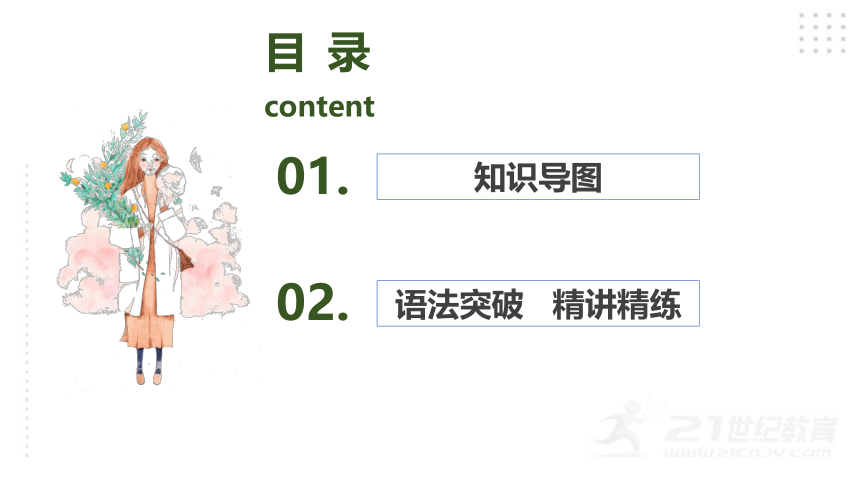

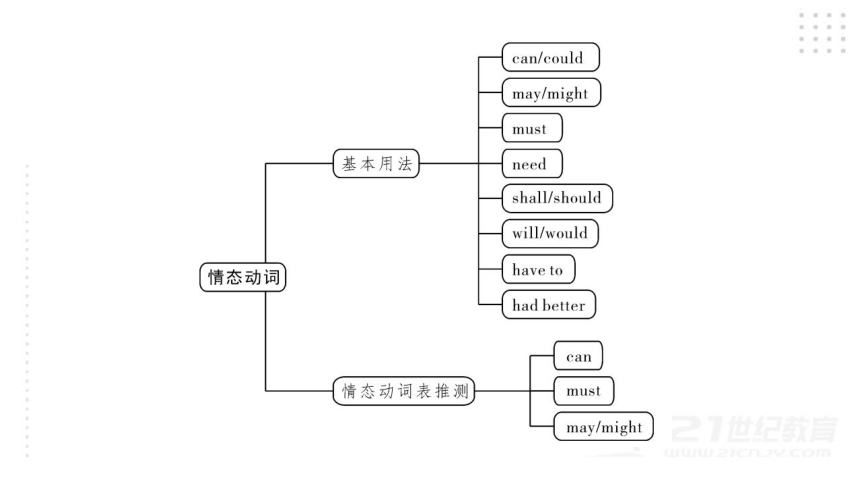

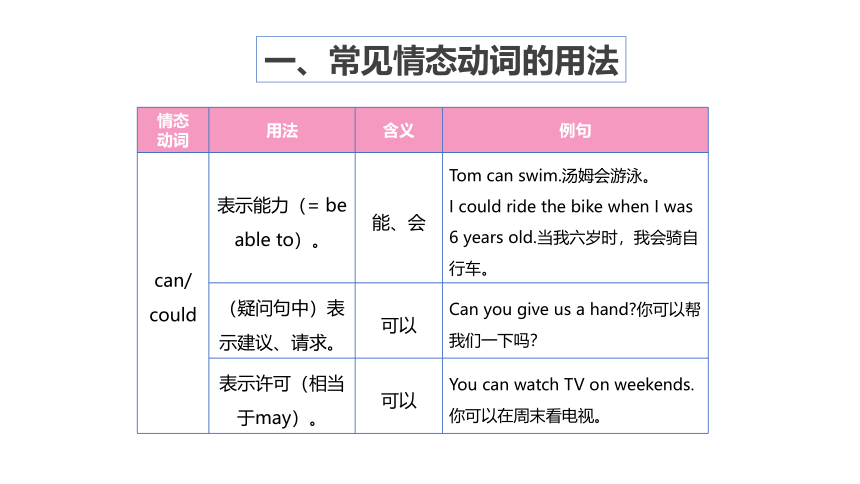
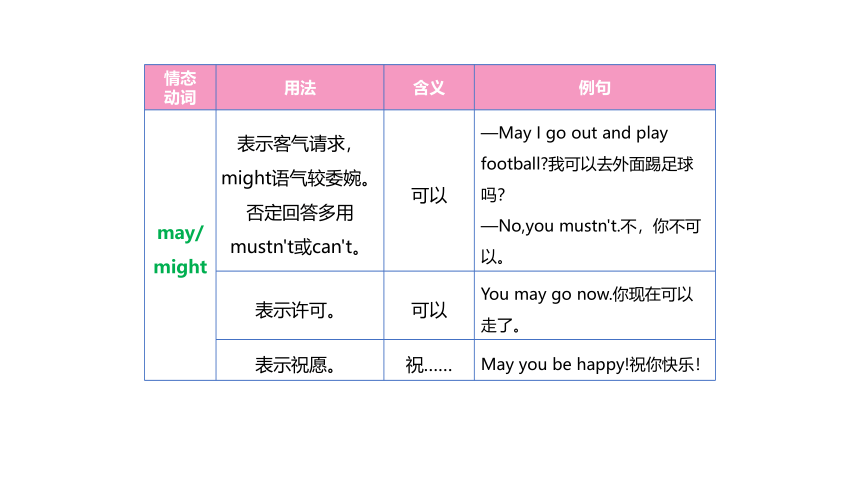
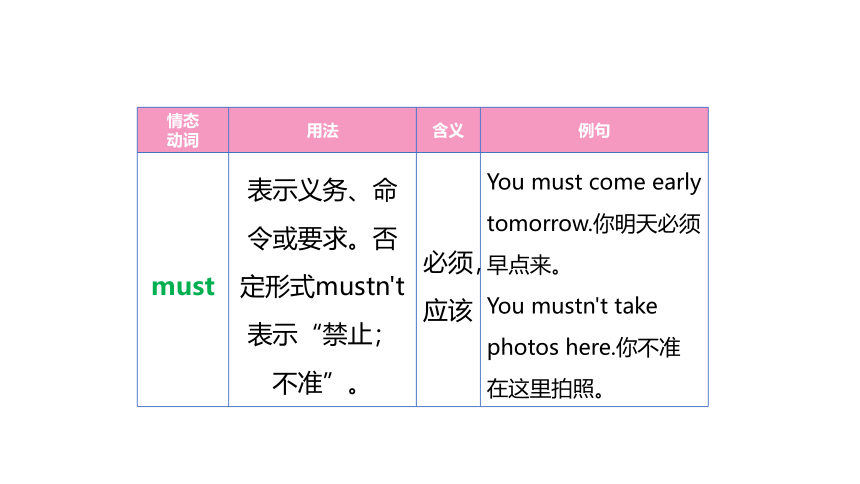
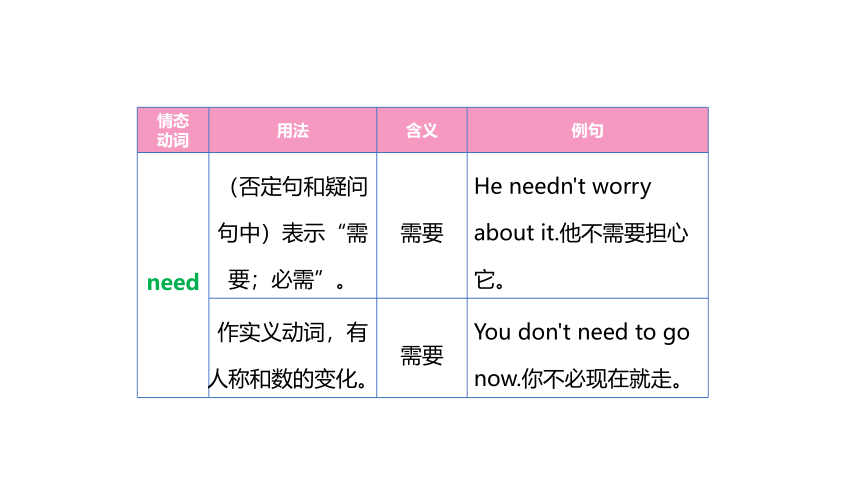
文档简介
(共23张PPT)
2
0
2
2
2022年中考英语二轮
专题复习
全国通用版
专题八 情态动词
知识导图
语法突破 精讲精练
目录
content
01.
02.
Part 01.
知识导图
Part 02.
语法突破
精讲精练
情态 动词 用法 含义 例句
can/ could 表示能力(= be able to)。 能、会 Tom can swim.汤姆会游泳。
I could ride the bike when I was 6 years old.当我六岁时,我会骑自行车。
(疑问句中)表示建议、请求。 可以 Can you give us a hand 你可以帮我们一下吗?
表示许可(相当于may)。 可以 You can watch TV on weekends.你可以在周末看电视。
一、常见情态动词的用法
情态 动词 用法 含义 例句
may/might 表示客气请求,might语气较委婉。否定回答多用mustn't或can't。 可以 —May I go out and play football 我可以去外面踢足球吗?
—No,you mustn't.不,你不可以。
表示许可。 可以 You may go now.你现在可以走了。
表示祝愿。 祝…… May you be happy!祝你快乐!
情态 动词 用法 含义 例句
must 表示义务、命令或要求。否定形式mustn't表示“禁止;不准”。 必须, 应该 You must come early tomorrow.你明天必须早点来。
You mustn't take photos here.你不准在这里拍照。
情态 动词 用法 含义 例句
need (否定句和疑问句中)表示“需要;必需”。 需要 He needn't worry about it.他不需要担心它。
作实义动词,有人称和数的变化。 需要 You don't need to go now.你不必现在就走。
情态 动词 用法 含义 例句
shall/ should Shall... 用于第一人称,表示建议或请求。 ……好吗? Shall we ask the teacher for help 我们向老师寻求帮助好吗?
should强调义务或责任,也可表示建议。 应该 You should do it by yourself.你应该自己完成它。
You should lie down and have a rest.你应该躺下休息一会儿。
情态 动词 用法 含义 例句
will/ would 表示征求意见(第二人称疑问句中)。 愿意 Will/Would you please take out the rubbish 你可以把垃圾拿出去吗?
will表示意愿、意志(用于多种人称)。 愿意 Your parents will try their best to help you.你的父母愿意尽最大的努力帮助你。
情态 动词 用法 含义 例句
Have to 表示客观需求,have要根据主语形式和时态相应变化。 不得不 He has to take a taxi because of the rain.由于下雨,他不得不乘坐出租车。
had better 表示劝告、建议。had常缩写为'd。 最好 You'd better go there today.你最好今天去那儿。
1.can与be able to
(1)相同点:后面都接动词原形;都可表示能力。
(2)不同点:can只有一般现在时和一般过去时,即can/could;可以用于否定句或疑问句中,表示判断或推测;be able to有多种时态变化以及人称和数的变化;表示“过去通过努力做成了某件事”只能用be able to。
要
点
提
醒
2.must与have to
(1)must表示说话人的主观意志,意为“必
须”,无人称和数的变化。其否定回答通常用don't have to或needn't,而不用mustn't。如:
—Must I finish my homework first 我必须先完成作业吗?
—No,you don't have to/needn't.不,你不必。
(2)have to 意为“不得不”,往往强调受到外界客观因素的迫使。它可用于多种时态,且有人称和数的变化。如:
It is going to rain.I have to go home now.快下雨了,我得回家了。
We didn't want to go but we had to.我们并不想去,但是不得不去。
3.以could开头的,表示委婉请求的疑问句,要用can回答,不能用could回答。如:
—Could I borrow this book 我能借这本书吗?
—Sorry,you can't.对不起,你不能。
学
以
致
用
1.I have traveled a lot.I can (会) speak four languages.
2.You needn't (不必) take a car to go there.It's only five minutes' walk.
3.We shouldn't (不应当) drink and drive.It's very dangerous.
4.Anyhow you must (必须) finish this work today.
5.— May/Can (可以) I use your ruler
—Sure.Here you are.
6.—Mum,could I take off my mask today It's a little hot.
—Well,I'm afraid we have to wear (wear) masks for some more time.
二 、情态动词表推测的用法
学
以
致
用
1.—Is Tom coming by train
—He may/might (可能) drive his car.I'm not sure.
2.—Look! The man welcoming us at the school gate must (一定) be our headmaster.
—No,it can't (不可能) be him.He is having a meeting in the office now.
3.这把雨伞一定是我妹妹的。(汉译英)
The umbrella must be my sister's.
2
0
2
2
2022年中考英语二轮
专题复习
全国通用版
专题八 情态动词
知识导图
语法突破 精讲精练
目录
content
01.
02.
Part 01.
知识导图
Part 02.
语法突破
精讲精练
情态 动词 用法 含义 例句
can/ could 表示能力(= be able to)。 能、会 Tom can swim.汤姆会游泳。
I could ride the bike when I was 6 years old.当我六岁时,我会骑自行车。
(疑问句中)表示建议、请求。 可以 Can you give us a hand 你可以帮我们一下吗?
表示许可(相当于may)。 可以 You can watch TV on weekends.你可以在周末看电视。
一、常见情态动词的用法
情态 动词 用法 含义 例句
may/might 表示客气请求,might语气较委婉。否定回答多用mustn't或can't。 可以 —May I go out and play football 我可以去外面踢足球吗?
—No,you mustn't.不,你不可以。
表示许可。 可以 You may go now.你现在可以走了。
表示祝愿。 祝…… May you be happy!祝你快乐!
情态 动词 用法 含义 例句
must 表示义务、命令或要求。否定形式mustn't表示“禁止;不准”。 必须, 应该 You must come early tomorrow.你明天必须早点来。
You mustn't take photos here.你不准在这里拍照。
情态 动词 用法 含义 例句
need (否定句和疑问句中)表示“需要;必需”。 需要 He needn't worry about it.他不需要担心它。
作实义动词,有人称和数的变化。 需要 You don't need to go now.你不必现在就走。
情态 动词 用法 含义 例句
shall/ should Shall... 用于第一人称,表示建议或请求。 ……好吗? Shall we ask the teacher for help 我们向老师寻求帮助好吗?
should强调义务或责任,也可表示建议。 应该 You should do it by yourself.你应该自己完成它。
You should lie down and have a rest.你应该躺下休息一会儿。
情态 动词 用法 含义 例句
will/ would 表示征求意见(第二人称疑问句中)。 愿意 Will/Would you please take out the rubbish 你可以把垃圾拿出去吗?
will表示意愿、意志(用于多种人称)。 愿意 Your parents will try their best to help you.你的父母愿意尽最大的努力帮助你。
情态 动词 用法 含义 例句
Have to 表示客观需求,have要根据主语形式和时态相应变化。 不得不 He has to take a taxi because of the rain.由于下雨,他不得不乘坐出租车。
had better 表示劝告、建议。had常缩写为'd。 最好 You'd better go there today.你最好今天去那儿。
1.can与be able to
(1)相同点:后面都接动词原形;都可表示能力。
(2)不同点:can只有一般现在时和一般过去时,即can/could;可以用于否定句或疑问句中,表示判断或推测;be able to有多种时态变化以及人称和数的变化;表示“过去通过努力做成了某件事”只能用be able to。
要
点
提
醒
2.must与have to
(1)must表示说话人的主观意志,意为“必
须”,无人称和数的变化。其否定回答通常用don't have to或needn't,而不用mustn't。如:
—Must I finish my homework first 我必须先完成作业吗?
—No,you don't have to/needn't.不,你不必。
(2)have to 意为“不得不”,往往强调受到外界客观因素的迫使。它可用于多种时态,且有人称和数的变化。如:
It is going to rain.I have to go home now.快下雨了,我得回家了。
We didn't want to go but we had to.我们并不想去,但是不得不去。
3.以could开头的,表示委婉请求的疑问句,要用can回答,不能用could回答。如:
—Could I borrow this book 我能借这本书吗?
—Sorry,you can't.对不起,你不能。
学
以
致
用
1.I have traveled a lot.I can (会) speak four languages.
2.You needn't (不必) take a car to go there.It's only five minutes' walk.
3.We shouldn't (不应当) drink and drive.It's very dangerous.
4.Anyhow you must (必须) finish this work today.
5.— May/Can (可以) I use your ruler
—Sure.Here you are.
6.—Mum,could I take off my mask today It's a little hot.
—Well,I'm afraid we have to wear (wear) masks for some more time.
二 、情态动词表推测的用法
学
以
致
用
1.—Is Tom coming by train
—He may/might (可能) drive his car.I'm not sure.
2.—Look! The man welcoming us at the school gate must (一定) be our headmaster.
—No,it can't (不可能) be him.He is having a meeting in the office now.
3.这把雨伞一定是我妹妹的。(汉译英)
The umbrella must be my sister's.
同课章节目录
- 词法
- 名词
- 动词和动词短语
- 动词语态
- 动词时态
- 助动词和情态动词
- 非谓语动词
- 冠词
- 代词
- 数词和量词
- 形容词副词及其比较等级
- 介词和介词短语
- 连词和感叹词
- 构词法
- 相似、相近词比较
- 句法
- 陈述句
- 一般疑问句和否定疑问句
- 特殊疑问句及选择疑问句
- 反意疑问句
- 存在句(There be句型)
- 宾语从句
- 定语从句
- 状语从句
- 主谓一致问题
- 简单句
- 并列句
- 复合句
- 主谓一致
- 主、表语从句
- 名词性从句
- 直接引语和间接引语
- 虚拟语气
- 感叹句
- 强调句
- 倒装句
- 祈使句
- 句子的成分
- 句子的分类
- 题型专区
- 单项选择部分
- 易错题
- 完形填空
- 阅读理解
- 词汇练习
- 听说训练
- 句型转换
- 补全对话
- 短文改错
- 翻译
- 书面表达
- 任务型阅读
- 语法填空
- 其他资料
